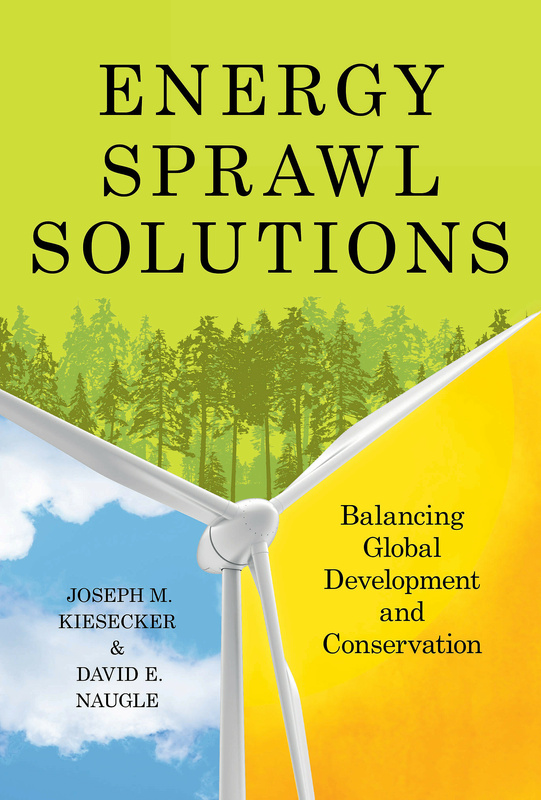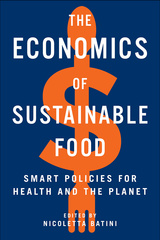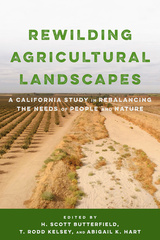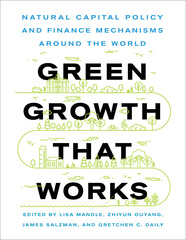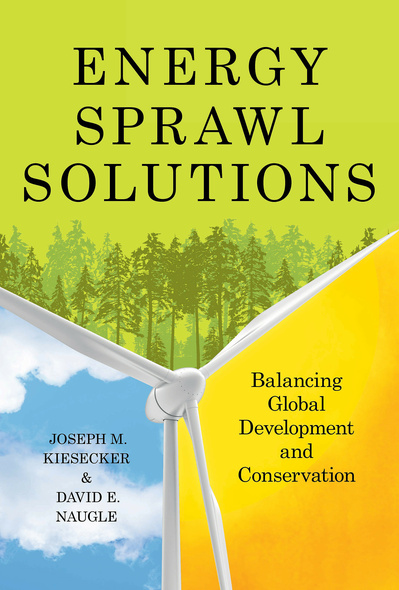
192 pages, 6 x 9
15 photos, 40 illustrations
Paperback
Release Date:15 Jun 2017
ISBN:9781610917223
Energy Sprawl Solutions
Balancing Global Development and Conservation
Edited by Joseph M. Kiesecker and David E. Naugle
Island Press
Over the next several decades, as human populations grow and developing countries become more affluent, the demand for energy will soar. Parts of the energy sector are preparing to meet this demand by increasing renewable energy production, which is necessary to combat climate change. But many renewable energy sources have a large energy sprawl—the amount of land needed to produce energy—which can threaten biodiversity and conservation. Is it possible to meet this rise in energy demand, while still conserving natural places and species?
In Energy Sprawl Solutions, scientists Joseph M. Kiesecker and David Naugle provide a roadmap for preserving biodiversity despite the threats of energy sprawl. Their strategy—development by design—brings together companies, communities, and governments to craft blueprints for sustainable land development. This commonsense approach identifies and preemptively sets aside land where biodiversity can thrive while consolidating development in areas with lower biodiversity value. This approach makes sense for energy industries and governments, which can confidently build sustainability into their energy futures.
This contributed volume brings together experts in diverse fields such as biodiversity conservation, ecology, ecosystem services, wildlife, fisheries, planning, energy, economics, and finance. Early chapters set the context for global patterns of biodiversity risk from energy extraction and the challenges of achieving a green future while maintaining energy security. Middle chapters are devoted to case studies from countries around the world, each describing a different energy sector and the collaborative process involved in planning complex energy projects in a way that maximizes biodiversity protection. Detailed maps and charts help orient readers to countries and energy sectors, providing proof for what is possible.
With biodiversity declining rapidly because of an energy-hungry world, this book provides a needed guide for elected officials, industry representatives, NGOs and community groups who have a stake in sustainable energy-development planning.
In Energy Sprawl Solutions, scientists Joseph M. Kiesecker and David Naugle provide a roadmap for preserving biodiversity despite the threats of energy sprawl. Their strategy—development by design—brings together companies, communities, and governments to craft blueprints for sustainable land development. This commonsense approach identifies and preemptively sets aside land where biodiversity can thrive while consolidating development in areas with lower biodiversity value. This approach makes sense for energy industries and governments, which can confidently build sustainability into their energy futures.
This contributed volume brings together experts in diverse fields such as biodiversity conservation, ecology, ecosystem services, wildlife, fisheries, planning, energy, economics, and finance. Early chapters set the context for global patterns of biodiversity risk from energy extraction and the challenges of achieving a green future while maintaining energy security. Middle chapters are devoted to case studies from countries around the world, each describing a different energy sector and the collaborative process involved in planning complex energy projects in a way that maximizes biodiversity protection. Detailed maps and charts help orient readers to countries and energy sectors, providing proof for what is possible.
With biodiversity declining rapidly because of an energy-hungry world, this book provides a needed guide for elected officials, industry representatives, NGOs and community groups who have a stake in sustainable energy-development planning.
Advocates for implementing best planning practices by including social, environmental, and economic objectives, along with engaging stakeholders in integrated planning...Recommended.'
With great clarity and urgency, the authors show that while trade-offs will be necessary, a clean energy future where both people and nature thrive is absolutely within our reach. Energy Sprawl Solutions is a must-read for anyone involved in energy decisions, from policymakers to business leaders to environmentalists.
Energy Sprawl Solutions is a timely blueprint confronting the duel challenge of emission reductions and energy access so needed in developing countries. Its innovative solutions demonstrate how strong science, stakeholder engagement, and a willingness to compromise can produce significant conservation gains while also meeting economic objectives.
This book is a realistic and sobering look at world energy and biodiversity futures and analysis of the natural, social, and economic factors that determine how energy projects are implemented worldwide. Its conclusions, if heeded, can help policy makers prioritize feasible options and put humanity on a path to carbon-neutral sustainability.
Joseph M. Kiesecker is Lead Scientist for The Nature Conservancy's Conservation Lands Team, in Fort Collins, Colorado. David E. Naugle is Professor of Wildlife Biology at the University of Montana in Missoula.
Preface
Acknowledgments
PART I: A Glimpse into Future Sprawl
Chapter 1. The Geography of Risk \ Jim Oakleaf, Sharon Baruch-Mordo, Christina Kennedy, and Joseph M. Kiesecker
Chapter 2. The Challenges of a Green Future \ Gert Jan Kramer
PART II: Solutions for Reducing Energy Sprawl
Chapter 3. North America: Energy Sprawl and Triage Conservation \ Mark Hebblewhite
Chapter 4. United States: Wind and Wildlife \ Joseph M. Kiesecker, Jeffrey S. Evans, Kei Sochi, Joe Fargione, Dave Naugle, Kevin Doherty
Chapter 5. California: Guiding Solar Energy Development with Regional Conservation Planning \ D. Richard Cameron, Laura Crane, Sophie S. Parker, and John M. Randall
Chapter 6. Venezuela: Offshore Oil \ Eduardo Klein, Juan José Cardenas, Roger Martínez, Juan Carlos González, Juan Papadakis, Kei Sochi, and Joseph M. Kiesecker
Chapter 7. Latin America: Energy and Ecosystem Services \ Heather Tallis
Chapter 8. Brazil: Planning Biofuels Expansion to Sustain Production and Environmental Quality in Brazilian Landscapes \ Christina M. Kennedy, Peter L. Hawthorne, Kei Sochi, Daniela Miteva, Leandro Baumgarten, Elizabeth M. Uhlhorn, and Joseph M. Kiesecker
Chapter 9. China and Brazil: The Future of Sustainable Energy and Healthy Rivers \ Jeff Opperman
PART III: Moving from Best Practice to Common Practice
Chapter 10. Sustainable Energy Landscapes: Policies, Practices, and Pathways \ Linda Krueger, Bruce McKenney, Graham Watkins, and Amal-Lee Amin
The Last Word: Conclusion
Acknowledgments
PART I: A Glimpse into Future Sprawl
Chapter 1. The Geography of Risk \ Jim Oakleaf, Sharon Baruch-Mordo, Christina Kennedy, and Joseph M. Kiesecker
Chapter 2. The Challenges of a Green Future \ Gert Jan Kramer
PART II: Solutions for Reducing Energy Sprawl
Chapter 3. North America: Energy Sprawl and Triage Conservation \ Mark Hebblewhite
Chapter 4. United States: Wind and Wildlife \ Joseph M. Kiesecker, Jeffrey S. Evans, Kei Sochi, Joe Fargione, Dave Naugle, Kevin Doherty
Chapter 5. California: Guiding Solar Energy Development with Regional Conservation Planning \ D. Richard Cameron, Laura Crane, Sophie S. Parker, and John M. Randall
Chapter 6. Venezuela: Offshore Oil \ Eduardo Klein, Juan José Cardenas, Roger Martínez, Juan Carlos González, Juan Papadakis, Kei Sochi, and Joseph M. Kiesecker
Chapter 7. Latin America: Energy and Ecosystem Services \ Heather Tallis
Chapter 8. Brazil: Planning Biofuels Expansion to Sustain Production and Environmental Quality in Brazilian Landscapes \ Christina M. Kennedy, Peter L. Hawthorne, Kei Sochi, Daniela Miteva, Leandro Baumgarten, Elizabeth M. Uhlhorn, and Joseph M. Kiesecker
Chapter 9. China and Brazil: The Future of Sustainable Energy and Healthy Rivers \ Jeff Opperman
PART III: Moving from Best Practice to Common Practice
Chapter 10. Sustainable Energy Landscapes: Policies, Practices, and Pathways \ Linda Krueger, Bruce McKenney, Graham Watkins, and Amal-Lee Amin
The Last Word: Conclusion

